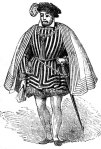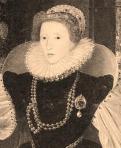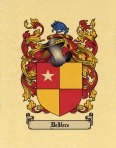My fourth of 100 reasons for concluding that Oxford was “Shakespeare” involves the actual language and contents of the eloquent Latin preface he contributed to Bartholomew Clerke’s 1572 Latin translation of The Courtier by the Italian statesman Baldassare Castiglione, published at Venice in 1528.
Imagine looking through records from the sixteenth century and suddenly coming upon an essay written by William Shakespeare when he was twenty-one years old. Think of the exhilaration upon discovering that the great poet-dramatist of Elizabethan England had crafted this early piece of writing (in Latin, no less) to proclaim “a new glory of language” while championing “all the glory of literature” — that is, a document in which the young Shakespeare predicts the marvelous works of language and literature that he himself was destined to produce.
If we believe “Shakespeare” to have been William Shakspere of Stratford-upon-Avon, we might well rush to claim a Nobel Prize for digging up this amazing contribution to literary history and biography!
Well, some of us believe that in fact we do have such an essay written by “Shakespeare” as a young man, although at twenty-one he was still using his real name, Edward de Vere the seventeenth earl of Oxford. In effect this was his “manifesto” as a young writer, publicly championing the humanistic side of the Renaissance with its medieval traditions of chivalry and, too, expressing values and intentions regarding literature that he would carry with him throughout his life. He presented his 1,100-word preface under the full panoply of his titles:
“Edward de Vere, Earl of Oxford, Lord Great Chamberlain of England, Viscount Bulbeck and Baron Scales and Badlesmere to the Reader – Greeting.”
“The English reader had never before been addressed in even terms by such a lord,” Charlton Ogburn Jr. noted, “and the subscription to the preface could well have been intended to make doubly plain the standing the lord was claiming for letters — ‘Given at the Royal Court.’”
“It is not only remarkable as an eloquent piece of Latin prose,” B. M. Ward wrote in 1928. “It seems to indicate a determination on the part of its author to do something more for literature than merely to accept dedications from authors. For the first time in our annals we find a nobleman taking immense trouble to recommend a book in which he is interested.”
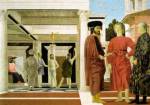
A Scene at the Palace of Urbino, where the conversations recalled in "The Courtier" (1528) had taken place in 1507
[Ward also noted that the preface was later reprinted in all subsequent editions of Clerke’s translation; and that it must have been read by most educated Elizabethans, to whom Latin was a “perfectly familiar language.”]
Six years later, in 1578, Oxford’s former Cambridge friend Gabriel Harvey would allude to the preface as a well-known example of the earl’s literary eminence:
“Let that courtly epistle, more polished even than the writings of Castiglione himself, witness how greatly thou dost excel in letters!”
In Oxford’s preface, translated into English by Ward, we find him praising the author of The Courtier:
“For what more difficult, more noble, or more magnificent task has anyone ever undertaken than our author Castiglione, who has drawn for us the figure and model of a courtier, a work to which nothing can be added, in which there is no redundant word, a portrait which we shall recognize as that of the highest and most perfect type of man. And so, although nature herself has made nothing perfect in every detail, yet the manners of men exceed in dignity that with which nature has endowed them; and he who surpasses others has here surpassed himself, and has even outdone nature which by no one has ever been surpassed.” (My emphasis)
Whoa! Look at that part about “nature” and see how it foreshadows the following lines of The Winter’s Tale (4.4) to be written by “Shakespeare” later on:
Yet nature is made better by no mean
But nature makes that mean: so, over that art
Which you say adds to nature, is an art
That nature makes.
Oxford goes on to say of Castiglione that “however elaborate the ceremonial, whatever the magnificence of the Court, the splendor of the Courtiers, and the multitude of spectators, he has been able to lay down principles for the guidance of the very Monarch himself.”
He takes the time to focus on the art of writing:
“For who has spoken of Princes with greater gravity? Who has discoursed of illustrious women with a more ample dignity? No one has written of military affairs more eloquently, more aptly about horse-racing, and more clearly and admirably about encounters under arms on the field of battle. I will say nothing of the fitness and the excellence with which he has depicted the beauty of chivalry in the noblest persons … Whatever is heard in the mouths of men in casual talk and in society, whether apt and candid, or villainous and shameful, that he has set down in so natural a manner that it seems to be acted before our very eyes.” (My emphases)
Whoa again! Now he seems to anticipate “Shakespeare” in Sonnet 81:
You still shall live (such virtue hath my pen)
Where breath most breathes, even in the mouths of men.
And in Hamlet’s advice (3.3) to the players:
“Suit the action to the word, the word to the action; with this special observance,that you o’erstep not the modesty of nature: for any thing so overdone is from the purpose of playing, whose end, both at the first and now, was and is, to hold, as’twere, the mirror up to nature…”
“Again to the credit of the translator of so great a work,” Oxford states, “a writer too who is no mean orator, must be added a new glory of language … For who is clearer in his use of words? Or richer in the dignity of his sentences? Or who can conform to the variety of circumstances with greater art? If weighty matters are under consideration, he unfolds his theme in a solemn and majestic rhythm; if the subject is familiar and facetious, he makes use of words that are witty and amusing. When therefore he writes with precise and well-chosen words, with skilfully constructed and crystal-clear sentences, and with every art of dignified rhetoric, it cannot be but that some noble quality should be felt to proceed from his work …”
He praises Clerke for dedicating the translation “to our most illustrious and noble Queen, in whom all courtly qualities are personalized, together with those diviner and truly celestial virtues. For there is no pen so skillful or powerful, no kind of speech so clear, that is not left behind by her own surpassing virtue.” Elizabeth is “of wisest mind, of soundest religion, and cultivated in the highest degree in learning and in literary studies.”
In these closing words of praise for his own prince, Oxford left little doubt that her Majesty had encouraged him in this extraordinary literary adventure openly issued from the Court:
“Lastly, if the noblest attributes of the wisest Princes, the safest protection of a flourishing commonwealth, the greatest qualities of the best citizens, by her own merit, and in the opinion of all, continually encompass her around; surely to obtain the protection of that authority, to strengthen it with gifts, and to mark it with the superscription of her name, is a work which, while worthy of all Monarchs, is most worthy of our own Queen, to whom alone is due all the praise of all the Muses and all the glory of literature. Given at the Royal Court 5 January 1571 (1572 – new style).”
When Oxford wrote that Castiglione had laid down “principles for the guidance of the very Monarch himself,” he was undoubtedly thinking of his own responsibility to try to guide his Queen, as Castiglione recorded in the dialogue at the Palace of Urbino:
“‘I think then that the aim of the perfect Courtier … is so to win for himself … the favor and mind of the prince whom he serves, that he may be able to say, and always shall say, the truth about everything which it is fitting for the prince to know, without fear or risk of giving offense thereby” [Oxford’s motto was Nothing Truer than Truth] and that when he sees his prince’s mind inclined to do something wrong, he may be quick to oppose, and gently to make use of the favor acquired by his good accomplishments, so as to banish every bad intent and lead his prince into the path of virtue … justice, liberality, magnanimity, gentleness, and the other virtues that become a good prince, and on the other hand how much infamy and loss proceed from the vices opposed to them…'”
I believe this is what Oxford tried to accomplish by means of the plays he brought to Court (from the 1570’s onward) for Queen Elizabeth. Over and over the advice of Castiglione’s characters drawn from real life is to “tell the truth” to one’s prince. Oxford also heeded The Courtier about literature:
“I would have him [the courtier] more than passably accomplished in letters, at least in those studies that are called the humanities, and conversant not only with the Latin language but with the Greek, for the sake of the many different things that have been admirably written therein. Let him be well versed in the poets, and not less in the orators and historians, and also proficient in writing verse and prose…”
Oxford also followed Castiglione’s view that a man of high birth (as Oxford was) needed to earn his exalted status by means of genuine accomplishment:
“For indeed if by being nobly born, graceful, agreeable, and expert in so many exercises, the Courtier brought forth no other fruit than merely being what he is, I should not deem it right for a man to devote so much study and pains to acquiring this perfection of Courtiership …”
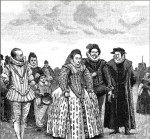 This is a basic ideas with which “Shakespeare” would grapple in his plays of English royal history, that is: Do we evaluate a monarch’s right to the throne solely on the basis of his blood right or, rather, on the basis of his actions that do or do not bring forth “other fruit than merely being what he is”?
This is a basic ideas with which “Shakespeare” would grapple in his plays of English royal history, that is: Do we evaluate a monarch’s right to the throne solely on the basis of his blood right or, rather, on the basis of his actions that do or do not bring forth “other fruit than merely being what he is”?
Dorothy and Charlton Ogburn in This Star of England (1952) observe that Oxford subsequently “adopted and developed the method Castiglione had taken from earlier writers, dramatizing the personages of Elizabeth Tudor’s court and those of foreign princes as well, to the degree that his plays presently became ‘the abstract and brief chronicles of the time'” [according to Hamlet, an exemplar of the perfect courtier].
“The young idealist who wrote this beautiful Latin prose did not perhaps suspect that he himself was to surpass Castiglione before many years had gone by,” the Ogburns note, “by writing as forcefully and engagingly in English as he was now able to do in Latin, because through his own genius the English language would be made richer and more flexible, would be given ‘majesty and light.'”
Is this “proof” that a little more than two decades later (in 1593) Oxford would adopt “Shakespeare” as a pen name? Of course not. But in fact it’s just one more piece of “the preponderance of the evidence” leading to that conclusion. And that’s number 4…


